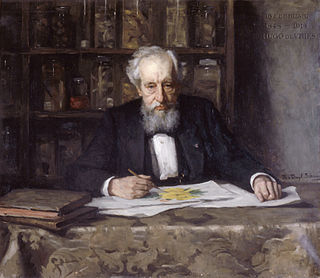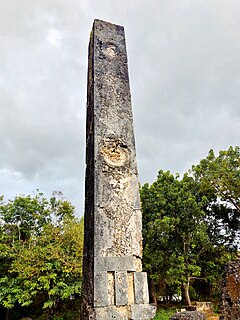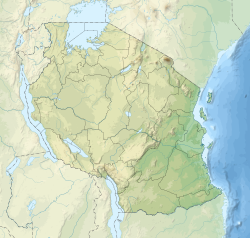
In ethics, casuistry is a process of reasoning that seeks to resolve moral problems by extracting or extending theoretical rules from a particular case, and reapplying those rules to new instances. This method occurs in applied ethics and jurisprudence. The term is also commonly used as a pejorative to criticize the use of clever but unsound reasoning, especially in relation to moral questions. It is the "[s]tudy of cases of conscience and a method of solving conflicts of obligations by applying general principles of ethics, religion, and moral theology to particular and concrete cases of human conduct. This frequently demands an extensive knowledge of natural law and equity, civil law, ecclesiastical precepts, and an exceptional skill in interpreting these various norms of conduct." It remains a common tool for applied ethics.
A dictatorship is a form of government characterized by an unelected leader or group of leaders that hold government power with few limitations. The leader of a dictatorship is called a dictator. Politics in a dictatorship take place between the dictator, the inner circle, and the opposition, which may be peaceful or violent. Dictatorships can be formed by a military coup that overthrows the previous government through force or by a self-coup in which elected leaders make their rule permanent. Dictatorships can be classified as military dictatorships, one-party dictatorships, personalist dictatorships, or absolute monarchies.

Aoudaghost, also transliterated as Awadaghust, Awdughast, Awdaghusht, Awdaghost, and Awdhaghurst is a former Berber town in Hodh El Gharbi, Mauritania. It was an important oasis town at the southern end of a trans-Saharan caravan route that is mentioned in a number of early Arabic manuscripts. The archaeological ruins at Tegdaoust in southern Mauritania are thought to be the remains of the medieval town.

Bagamoyo, is a historic coastal town founded at the end of the 18th century, though it is an extension of a much older Swahili settlement, Kaole. It was chosen as the capital of German East Africa by the German colonial administration and it became one of the most important trading ports for the Germans along the East African coast along the west of the Indian Ocean in the late 19th and early 20th century. Today, it is the capital of the Bagamoyo District in Pwani Region. In 2011, the town had 82,578 inhabitants.

Mutationism is one of several alternatives to evolution by natural selection that have existed both before and after the publication of Charles Darwin's 1859 book On the Origin of Species. In the theory, mutation was the source of novelty, creating new forms and new species, potentially instantaneously, in sudden jumps. This was envisaged as driving evolution, which was thought to be limited by the supply of mutations.

Ephemerality is the concept of things being transitory, existing only briefly. Typically the term ephemeral is used to describe objects found in nature, although it can describe a wide range of things, including human artifacts intentionally made to last for only a temporary period in order to increase their perceived aesthetic value. With respect to unique performances, for example, it has been noted that "[e]phemerality is a quality caused by the ebb and flow of the crowd's concentration on the performance and a reflection of the nostalgic character of specific performances". Because different people may value the passage of time differently, "the concept of ephemerality is a relative one" and "there is no single definition of ephemerality".

The Tongoni Ruins are a 15th century Swahili ruins of a mosque and forty tombs located in Tongoni ward in Tanga District inside Tanga Region of Tanzania. The area was a different place four to five centuries ago. Contrary to its almost unnoticed presence today, it was a prosperous and a respected Swahili trading centre during the 15th century. Most of the ruins are still not yet been uncovered. The site is a registered National Historic Site.

The Haya are a Bantu ethnic group based in Kagera Region, northwestern Tanzania, on the western side of Lake Victoria. With over one million people, it is estimated the Haya make up approximately 2% of the population of Tanzania. Historically, the Haya have had a complex kingship-based political system. Agriculture, particularly banana farming, is central to Haya economic life.

Slavery has historically been widespread in Africa. Systems of servitude and slavery were common in parts of Africa in ancient times, as they were in much of the rest of the ancient world. When the trans-Saharan slave trade, Indian Ocean slave trade and Atlantic slave trade began, many of the pre-existing local African slave systems began supplying captives for slave markets outside Africa. Slavery in contemporary Africa is still practised despite it being illegal.

The Bania is an occupational community of merchants, bankers, money-lenders, and owners of commercial enterprises. The community is composed of several sub-castes including the Agarwal Banias, Oswal Banias,Gupta and Porwal Banias, among others. The term is used in a wider sense in Bengal than it is elsewhere in India, where it is applied to all money-lenders and indigenously developed bankers, irrespective of caste. Most Banias follow Hinduism and Jainism but a few have converted to Sikhism, Islam, Christianity and Buddhism.
Ma'adin Ijafen is an archaeological site in an area of dunes in the Sahara in eastern Mauritania. It was first discovered in the early 1960s by the French explorer Théodore Monod. Monod followed up on information provided by local hunters, searching for evidence to confirm the magnitude of the historical trans-Saharan copper trade. 450 mi (720 km) into the desert, he located bundles of cowrie shells and ingots of brass wrapped in ropes and matting and hidden in the sand.
M. A. Rafey Habib is an academic humanities scholar.

Ehud R. Toledano is professor of Middle East history at Tel Aviv University and the current director of the Program in Ottoman & Turkish Studies. His areas of specialization are Ottoman history, and socio-cultural history of the modern Middle East.
Jagdish Mehra was an Indian-American historian of science.
This bibliography includes major books and articles about British prime minister Margaret Thatcher and her policies in office.
Elizabeth Eva Leach is a British musicologist and music theorist who specializes in medieval music, especially that of the fourteenth century.
Reginald Herbold Green was an American development economist who focused on African economic issues. His research focus included studying the economies of eastern and southern Africa, South African Development Community (SADC), international organizations and aid disbursement, and the Economic Commission on Africa, specializing in poverty alleviation, development enablement, and economic liberalization.

National Historic Sites of Tanzania is an official list of places in Tanzania that have been designated as National Historic Sites as per the Ministry of Natural Resources and Tourism of Tanzania under the Antiquities Division. The list is not complete and is currently being updated.
The West Nyanza languages are a subgroup of the Great Lakes Bantu languages spoken in Uganda, Tanzania and the DRC.











